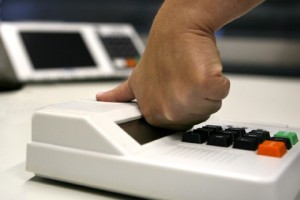The 2014 Brazilian General Elections will take place on October 5, with the possibility of a second round on the 26 of that same month. The voting will serve to elect the nation’s president, governors, and federal and state deputies. Currently, the Brazilian e-voting platform, fitting of a pioneer nation in the field of e-voting, includes biometric voter authentication, voting, results transmission and consolidation, awarding and results publishing.
This election will see the use of 530 thousand e-voting machines to record the votes of 141 million Brazilians. The South American nation faces this electoral process with a robust satellite communication system, which guarantees access to the vote to those inhabiting the most remote areas of the Brazilian territory.
Smartmatic, world leader in electoral technology and services, signed a contract with the Brazilian Superior Electoral Court (TSE) to guarantee voice and data communication services in 15 of the country’s most remote states for the October elections.

The complete service package offered by Smartmatic to enable communications includes: the configuration and deployment of BGAN terminals, the training of the instructors designated by the TSE, equipment maintenance and the creation of an 800-number call centre for technical support.
“Guaranteeing the right to vote to people residing in the most remote areas of the fifth largest country in the planet; this is the kind of project that gives a special meaning to Smartmatic’s work. We are excited to take part once again in Brazil’s elections and to work with one of the world’s most innovative electoral commissions”, stated Antonio Mugica, Smartmatic’s CEO.
Brazil is one of the leading countries in electoral automation. They have been using e-voting machines since 1996, and they are expected to have all their voters in a biometric registry by 2017.
The Superior Electoral Court informed that 21.6 million Brazilians -15% of the voter registry which will partake in the 2014 general elections- will vote using e-voting machines and a biometric identification system. The equipment will be used in 762 municipalities, including 15 departmental capital cities.
TSE’s Information Technology Secretary Giuseppe Janino, assured that “[this] is the safest process there is. We can say there is no such thing as a perfect system, but without a doubt biometric identification is infinitely more precise and safe than regular, man-made identification.” He added that the risk of fraud, errors and delays is reduced.